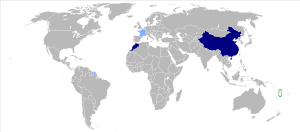Foreign relations of Vanuatu facts for kids
Vanuatu is a small island nation in the Pacific Ocean. Like all countries, it talks and works with other nations around the world. This is called having diplomatic relations. Vanuatu has made friends with over 65 countries. It has a few special offices called embassies or high commissions in other countries. These offices help Vanuatu connect with those nations. Only a few countries, like Australia, France, New Zealand, and China, have their own embassies or missions in Vanuatu's capital, Port Vila.
Contents
Helping Each Other: Vanuatu and Global Organizations
Vanuatu's government really wants to make its economy stronger. To do this, it needs foreign aid, which is help and money from other countries or big organizations. Because of this need, Vanuatu has joined important groups like the Asian Development Bank, the World Bank, and the International Monetary Fund (IMF). Since 1980, countries like Australia, France, the United Kingdom, and New Zealand have given most of this development aid to Vanuatu.
Vanuatu's Stance on Independence
Vanuatu's foreign policy (how it deals with other countries) is usually neutral. This means it tries not to take sides in big world conflicts. For example, it stayed neutral during the Cold War (a long period of tension between major world powers). Since 1983, Vanuatu has been part of the Non-Aligned Movement. This is a group of countries that don't formally align with or against any major power bloc.
However, Vanuatu has always strongly supported self-determination. This means countries or groups of people should be able to choose their own future and govern themselves. It also strongly supports decolonisation, which is when countries that were once colonies become independent. This support is especially strong for islands in its own region, Melanesia.
Vanuatu itself became independent from France and the United Kingdom in 1980. Its first government quickly recognized the Sahrawi Arab Democratic Republic in November 1980. Later, it recognized the State of Palestine in 1989. More recently, Vanuatu recognized Kosovo in 2010 and Abkhazia in 2011. Vanuatu has also supported the independence of New Caledonia and East Timor. It strongly supports the Free Papua Movement in western New Guinea. This support has sometimes made its relationship with Indonesia difficult.
Growing Friendships Around the World
Vanuatu has worked to build friendships with many different countries. It started diplomatic relations with Cuba in 1983 and Libya in 1986. It also established ties with the Soviet Union (now mostly Russia) and the United States in 1986. Relationships with the United States were a bit difficult at first but improved by the late 1980s. Relations with France also had some challenges during the 1980s.
Under its first leader, Walter Lini, Vanuatu also tried to build strong connections with countries in Asia. By the end of the 1980s, Vanuatu had made friends with China, Japan, South Korea, North Korea, Thailand, Malaysia, Singapore, Vietnam, and the Philippines.
Strong Connections: Australia and Pacific Neighbors
Australia and Vanuatu have very close ties. Australia provides most of the help for Vanuatu's military. It is also the biggest source of foreign money invested in Vanuatu, tourists visiting the country, and foreign aid.
Vanuatu also has strong connections with other Pacific countries. It is a full member of the Pacific Islands Forum, which is a very important group for Pacific nations. It also belongs to several other regional organizations. Vanuatu joined the Organisation internationale de la Francophonie (a group of French-speaking countries) in 1979. It became a member of the Commonwealth of Nations (a group of countries that were once part of the British Empire) in 1980. In 1981, Vanuatu joined the United Nations, the largest international organization for world peace and cooperation. Vanuatu is currently the only Pacific nation that is part of the Non-Aligned Movement.
 | Mary Eliza Mahoney |
 | Susie King Taylor |
 | Ida Gray |
 | Eliza Ann Grier |


